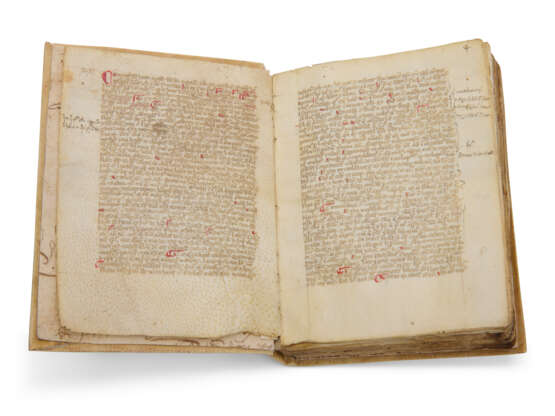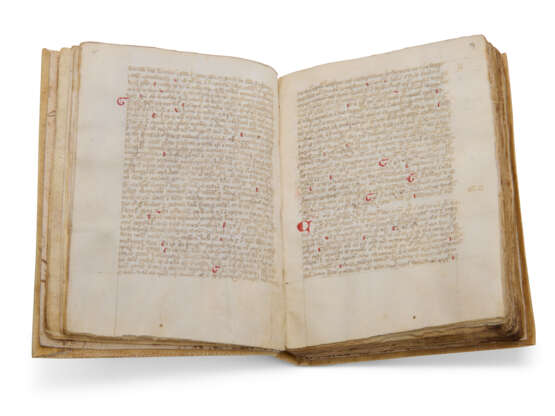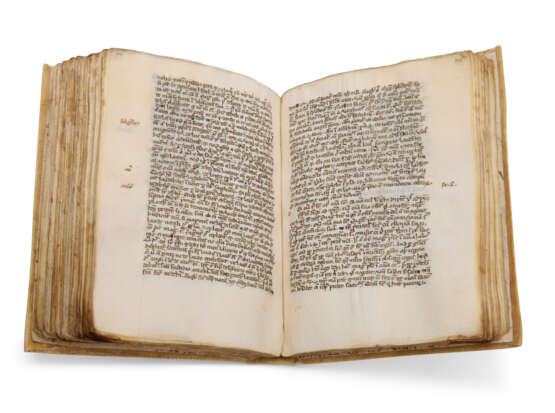ID 1450538
Lot 8 | Jacobus de Voragine (c.1230-1298)
Estimate value
£ 7 000 – 10 000
Sermones quadragesimales, in Latin, manuscript on vellum [Germany, c.1300]
A working volume for preachers of Jacobus de Voragine's popular Lenten sermons, written not long after the author's death.
c.130 x 100mm, i (paper) +143 + i (paper) leaves, collation: 17 (of 8, lacking i), 2-68, 710, 8-108, 11-1410, 15-168, 176 (of 10, lacking vii-x), early foliation 2-144 followed here, horizontal catchwords survive, 32 lines written in a small, highly-abbreviated hand, ruled space: 92 x 68mm, initials, rubrics and paraphs in red until at least f.43, thereafter spaces left for initials, sporadic maniculae and later annotations (lacking opening leaf but seemingly with no loss of text, and a few at the end, a few wormholes, some minor cockling and staining). Bound in 16th-century limp vellum over pasteboards (a little yellowed).
Provenance:
(1) Endleaves and pastedowns from 16th-century German account books.
Content:
Jacobus de Voragine (c.1230-1298), Sermones quadragesimales, ff.1-143v, opening with Jeremiah 6, 26: 'Filia populi mei indue cilicio, spargere cinere luctum unigeniti fac tibi, planctum amarum', and the text proper: 'Quamvis sollemnitas quadragesimalis in sequenti dominica inchoetur'. The text of the Sermons largely follows J.B. Schneyer, Repertorium der lateinischen Sermones des Mittelalters für die Zeit von 1150-1350, v.3 (1971), pp.238-246, with a few variations and omissions (e.g. the sermons 'Et cena facta cum diabolus [...] Quando amici ab invicem separantur' [Schneyer, 3, 282] and 'Probet autem seipsum homo [...] Si aliquis debet aliqeum' [Schneyer, 3, 281] are switched around; sermons 283-4 are omitted with the text continuing 'Venit Maria Magdalena et altera Maria [...] Magna dignitas est septimi diei') until f.131v; then follow a number of anonymous sermons on the Passion: 'En ego morior et Deus erit vobiscum [...] Ut excessiva' f.131v; 'Beata Virgo Maria ait in canticis canticorum' f.134; 'Quo abiit dilectus tuus [...] Triplici de cantici' (not Jacobus de Voragine's sermon 293) f.139; and ending with a sermon for Palm Sunday: 'Ecce rex tuus venit', ending 'dedi corpus meum percutientibus [...]', lacking end.
The present manuscript is a portable, functional and extremely early copy of the Italian chronicler and Archbishop of Genoa Jacobus de Voragine's popular Lenten sermons, which were composed some time before 1286. Jacobus de Voragine (or Iacopo da Varazze) was one of the most influential Dominican authors of the 13th century, and is best known for his Legenda Aurea, a compilation to accompany the major feasts in the church calendar, detailing the lives and miracles of saints and explicating events in the lives of Christ and the Virgin, ordered according to the liturgical year. He was also a prolific writer of sermons; his Lenten sermons appeared individually and as parts of larger compilations throughout the Middle Ages and well into the Renaissance, becoming the standard compilation used by preachers across Europe. The Lenten sermons survive in more than 300 manuscripts and is the only cycle that has been edited in a modern edition (Iacopo da Varazze, Sermones Quadragesimales, ed. by G.P. Maggioni, 2005).
| Place of origin: | Western Europe, Germany, Europe |
|---|---|
| Auction house category: | Medieval & renaissance manuscripts, Books and manuscripts |
| Place of origin: | Western Europe, Germany, Europe |
|---|---|
| Auction house category: | Medieval & renaissance manuscripts, Books and manuscripts |
| Address of auction |
CHRISTIE'S 8 King Street, St. James's SW1Y 6QT London United Kingdom | |
|---|---|---|
| Preview |
| |
| Phone | +44 (0)20 7839 9060 | |
| Buyer Premium | see on Website | |
| Conditions of purchase | Conditions of purchase |






